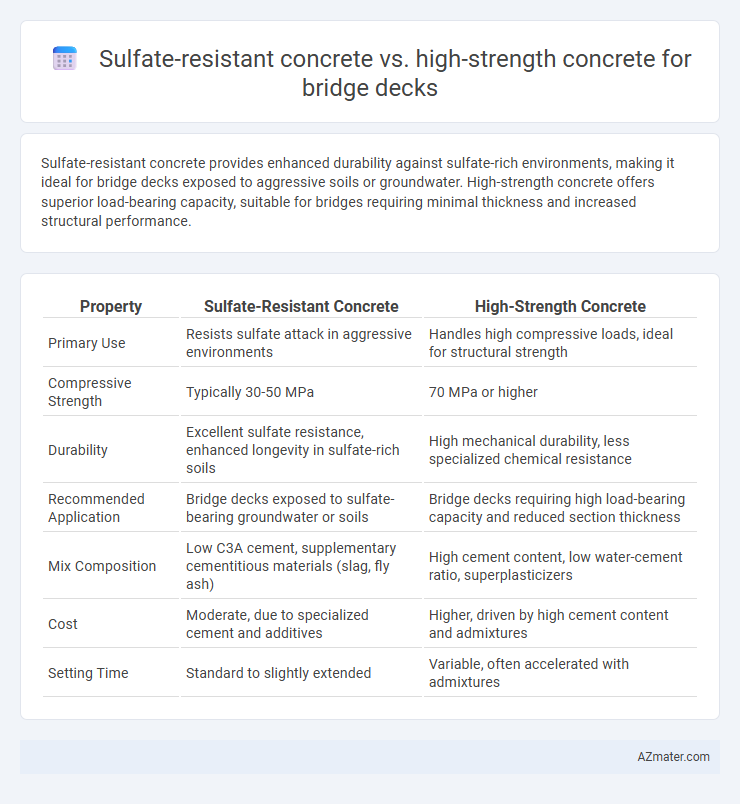Sulfate-resistant concrete provides enhanced durability against sulfate-rich environments, making it ideal for bridge decks exposed to aggressive soils or groundwater. High-strength concrete offers superior load-bearing capacity, suitable for bridges requiring minimal thickness and increased structural performance.
Table of Comparison
| Property | Sulfate-Resistant Concrete | High-Strength Concrete |
|---|---|---|
| Primary Use | Resists sulfate attack in aggressive environments | Handles high compressive loads, ideal for structural strength |
| Compressive Strength | Typically 30-50 MPa | 70 MPa or higher |
| Durability | Excellent sulfate resistance, enhanced longevity in sulfate-rich soils | High mechanical durability, less specialized chemical resistance |
| Recommended Application | Bridge decks exposed to sulfate-bearing groundwater or soils | Bridge decks requiring high load-bearing capacity and reduced section thickness |
| Mix Composition | Low C3A cement, supplementary cementitious materials (slag, fly ash) | High cement content, low water-cement ratio, superplasticizers |
| Cost | Moderate, due to specialized cement and additives | Higher, driven by high cement content and admixtures |
| Setting Time | Standard to slightly extended | Variable, often accelerated with admixtures |
Introduction to Bridge Deck Concrete Challenges
Bridge deck concrete must withstand heavy traffic loads, environmental exposure, and chemical attacks from deicing salts and sulfates, posing significant durability challenges. Sulfate-resistant concrete offers enhanced protection against sulfate-induced deterioration, making it suitable for aggressive exposure conditions. High-strength concrete provides superior load-bearing capacity and structural performance but may require additional measures to ensure chemical resistance in bridge decks.
Overview of Sulfate-Resistant Concrete
Sulfate-resistant concrete is specifically engineered to withstand environments with high sulfate concentrations, preventing deterioration caused by chemical reactions between sulfates and concrete components. This type of concrete typically incorporates sulfate-resistant cement, such as Type V Portland cement, which reduces the risk of expansion and cracking in bridge decks exposed to aggressive sulfate-rich soils or groundwater. Its durability in harsh conditions makes it ideal for bridge decks in sulfate-affected areas, ensuring long-term structural integrity and reduced maintenance costs.
Properties and Composition of High-Strength Concrete
High-strength concrete (HSC) for bridge decks typically features a compressive strength exceeding 6000 psi, achieved through a low water-cement ratio, high cement content, and the incorporation of silica fume or fly ash for enhanced durability and reduced permeability. Its dense microstructure improves resistance to mechanical stresses and environmental degradation, making it ideal for heavy load-bearing applications. Compared to sulfate-resistant concrete, which primarily focuses on chemical resistance through specialized cement types like sulfate-resisting Portland cement, HSC emphasizes structural performance and long-term mechanical stability.
Durability Requirements for Bridge Decks
Sulfate-resistant concrete is specifically formulated to withstand aggressive sulfate environments, enhancing durability for bridge decks exposed to soil and groundwater with high sulfate content, thus preventing chemical deterioration and ensuring long-term structural integrity. High-strength concrete provides superior compressive strength and resistance to mechanical stresses but may require additional admixtures or protective measures to resist sulfate attack in harsh environments. Choosing the appropriate concrete type for bridge decks depends on site-specific sulfate exposure and load conditions, ensuring optimal durability and service life.
Performance Under Sulfate Attack
Sulfate-resistant concrete exhibits superior durability under sulfate attack by using low-permeability cement and supplementary cementitious materials that limit sulfate ion penetration and prevent expansion-induced cracking. High-strength concrete, while offering enhanced compressive strength, may possess higher permeability, increasing vulnerability to sulfate-induced degradation in aggressive environments. Selecting sulfate-resistant concrete ensures prolonged bridge deck service life by mitigating chemical deterioration in sulfate-rich soils or groundwater conditions.
Structural Strength Comparison
Sulfate-resistant concrete, designed to withstand sulfate attack in aggressive environments, typically exhibits moderate compressive strengths ranging from 30 to 50 MPa, prioritizing durability over maximum load capacity. High-strength concrete used for bridge decks often exceeds 60 MPa compressive strength, providing superior load-bearing capacity and enhanced structural performance under heavy traffic loads. Structural strength comparison reveals that while sulfate-resistant concrete ensures long-term durability in sulfate-rich soils, high-strength concrete delivers greater initial structural capacity, making the choice dependent on environmental exposure and load demands.
Longevity and Maintenance Considerations
Sulfate-resistant concrete offers enhanced durability in aggressive sulfate-rich environments, reducing chemical deterioration and extending bridge deck lifespan significantly compared to standard mixes. High-strength concrete provides superior load-bearing capacity and resistance to mechanical stresses but may be more susceptible to sulfate attack, potentially increasing maintenance costs over time. Selecting sulfate-resistant concrete for bridge decks in sulfate-prone areas minimizes frequent repairs and preserves structural integrity, optimizing long-term maintenance efficiency.
Cost Implications and Economic Analysis
Sulfate-resistant concrete typically incurs higher initial material costs due to specialized cement and additives designed to withstand sulfate attack, which enhances long-term durability for bridge decks in aggressive environments. High-strength concrete often requires more cement content and carefully controlled mix proportions, leading to increased costs but provides superior load-bearing capacity and reduced structural thickness, potentially lowering overall material use and labor costs. Economic analysis favors sulfate-resistant concrete for projects exposed to sulfate-rich soils or water, where maintenance and repair costs are significantly reduced, whereas high-strength concrete offers cost advantages in designs prioritizing weight reduction and longer spans.
Suitability for Bridge Deck Applications
Sulfate-resistant concrete is highly suitable for bridge decks exposed to aggressive sulfate soils or seawater, providing enhanced durability by resisting chemical attack and preventing structural deterioration. High-strength concrete offers superior load-bearing capacity and durability, making it ideal for bridge decks subjected to heavy traffic and dynamic loads. Selecting between these concretes depends on environmental exposure and load requirements, with sulfate-resistant concrete prioritized in corrosive environments and high-strength concrete favored for structural performance demands.
Final Recommendations for Concrete Selection
Sulfate-resistant concrete offers enhanced durability in aggressive chemical environments, making it ideal for bridge decks exposed to sulfate-rich soils or waters. High-strength concrete provides superior load-bearing capacity and reduced material volume, suitable for bridges prioritizing structural performance and longer spans. Selecting the optimal concrete depends on environmental conditions and structural demands, with sulfate resistance favored in corrosive settings and high strength preferred for heavy load requirements.

Infographic: Sulfate-resistant concrete vs High-strength concrete for Bridge deck
 azmater.com
azmater.com